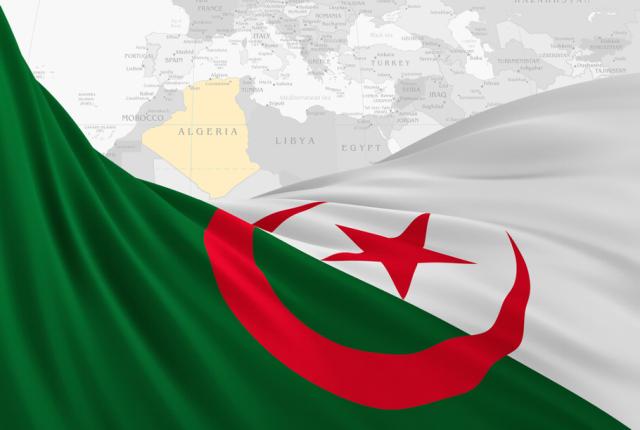
Algeria ranks third globally after China and Argentina in technically recoverable shale gas reserves with 20 Tcm, according to the U.S. Energy Information Administration. (Source: Shutterstock.com)
Developing abundant shale gas has become a necessity for Algeria to reverse its declining domestic natural gas production and safeguard its economy.
Local gas demand is expected to rise rapidly due to continued population growth. In the decade to 2014, domestic gas consumption has more than tripled. On the top of that, the Algerian Electricity and Gas Regulation Commission projects domestic gas consumption will grow by another 50% to 50 Bcm by 2020.
Algeria is considered one of the main reliable gas suppliers to Europe through three trans-Mediterranean pipelines. The country’s gas exports to Europe increased slightly in 2017 to 55 Bcm compared to 54 Bcm in 2016, according to Sonatrach CEO Abdelmoumen Ould Kaddour.
To meet growing local consumption and to keep the steady flow of gas to Europe, Algeria needs to tap it shale gas reserve, which is considered one of the world’s largest technically recoverable shale gas resources, according to the U.S. Energy Information Administration (EIA). Algeria ranks third globally after China and Argentina in technically recoverable shale gas reserves with 20 Tcm (707 Tcf of reserves, the EIA said in a 2013 report.
Meanwhile, the Algerian energy ministry estimates total technically recoverable resources at 741 Tcf, using a recovery factor of 15%, and covering Ahnet, Timimoun, Bechar, Berkine Berkine and Illizi basins.
Prime Minister Ahmed Ouyahia encouraged management of the government-owned firm “to invest in the shale gas sector.”
“It is time for Sonatrach to use all its energy in the service of business and the country,” Ouyahia said. “This is not adventurism but an option aimed at guaranteeing the future in terms of energy.”
Evaluating and developing shale gas in Algeria is becoming a priority as several shale gas evaluation projects covering different basins are in process or have been finalized, despite the public protests mainly due to the lack of knowledge about hydraulic fracturing.
In 2014, Sonatrach completed drilling its first shale gas pilot project in the Ahnet Basin. The well confirmed the existence of substantial reserves of shale gas in the Ahnet Basin, located in In Salah, 650 km northwest of Tamanrasset.
The drilling of AHT1 H2 well, completed within four months, used 7,000 cm of water as part of the hydraulic fracturing technique used during drilling. Sonatrach plans to drill five pilot wells and has already started drilling a second pilot well, AHT1 H1.
Sonatrach estimates total reserves of 200,000 Bcm of gas in the Ahnet Basin. About 10% of these reserves are extractable, including 20,000 Bcm of recoverable gas.
The North Western Sahara Aquifer System shared by Algeria, Libya and Tunisia contains considerable water reserves, which are not fully exploitable (40 000 Bcm).
Though even Sonatrach officials do not expect commercial production before the end of this decade, they are confident that commercial exploitation is a question of when, not if, as geological conditions at first glance appear highly favorable.
Many potential partners are familiar with operating in Algeria, both in terms of the Sahara’s geophysical conditions and the political climate. Sonatrach has started talks with France’s Total and Italy’s ENI, Sonatrach officials said, according to media reports. The firms have not confirmed this, although Total’s CEO said in December 2017 that his company was open to greater cooperation after Sonatrach said it would work with Total on shale gas.
Plus, in 2013, Algerian authorities substantially revised the existing legislative framework to further incentivize shale gas extraction, providing for relatively low service taxes as well as attractive royalties schemes.
While the regions of expected shale gas extraction are not densely populated, possibly minimizing social resistance, there have been public protests against hydraulic fracturing for shale gas in southern Algeria. Sonatrach and its international partners’ attempts to monetize the unconventional resource have been hampered.
Recommended Reading
Murphy Shares Drop on 4Q Miss, but ’25 Plans Show Promise
2025-02-02 - Murphy Oil’s fourth-quarter 2024 output missed analysts’ expectations, but analysts see upside with a robust Eagle Ford Shale drilling program and the international E&P’s discovery offshore Vietnam.
Utica Liftoff: Infinity Natural Resources’ Shares Jump 10% in IPO
2025-01-31 - Infinity Natural Resources CEO Zack Arnold told Hart Energy the newly IPO’ed company will stick with Ohio oil, Marcellus Shale gas.
Not Sweating DeepSeek: Exxon, Chevron Plow Ahead on Data Center Power
2025-02-02 - The launch of the energy-efficient DeepSeek chatbot roiled tech and power markets in late January. But supermajors Exxon Mobil and Chevron continue to field intense demand for data-center power supply, driven by AI technology customers.
Buying Time: Continuation Funds Easing Private Equity Exits
2025-01-31 - An emerging option to extend portfolio company deadlines is gaining momentum, eclipsing go-public strategies or M&A.
Utica Oil’s Infinity IPO Values its Play at $48,000 per Boe/d
2025-01-30 - Private-equity-backed Infinity Natural Resources’ IPO pricing on Jan. 30 gives a first look into market valuation for Ohio’s new tight-oil Utica play. Public trading is to begin the morning of Jan. 31.
Comments
Add new comment
This conversation is moderated according to Hart Energy community rules. Please read the rules before joining the discussion. If you’re experiencing any technical problems, please contact our customer care team.






